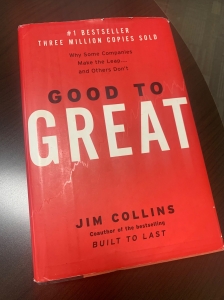Resilience: Good to Great
Michele Dempster | September 23, 2020
Michele Dempster | September 23, 2020
 You may be familiar with the popular leadership book Good to Great by Jim Collins. As we reflect on the character trait of Resilience, I would like to share a story from Good to Great (2001) about Admiral Jim Stockdale and the Stockdale Paradox.
You may be familiar with the popular leadership book Good to Great by Jim Collins. As we reflect on the character trait of Resilience, I would like to share a story from Good to Great (2001) about Admiral Jim Stockdale and the Stockdale Paradox.
Admiral Jim Stockdale was the highest-ranking United States military officer in the ‘Hanoi Hilton’ prisoner-of-war camp during the height of the Vietnam War. Tortured over twenty times during his eight-year imprisonment from 1965 to 1973, Stockdale lived out the war without any prisoner’s rights, no set release date, and no certainty as to whether he would even survive to see his family again. He shouldered the burden of command, doing everything he could to create conditions that would increase the number of prisoners who would survive unbroken, while fighting an internal war against his captors and their attempts to use the prisoners for propaganda. At one point, he beat himself with a stool and cut himself with a razor, deliberately disfiguring himself, so that he could not be put on videotape as an example of a ‘well-treated prisoner.’ He exchanged secret intelligence information with his wife through their letters, knowing that discovery would mean more torture and perhaps death. He instituted rules that would help people to deal with torture (no one can resist torture indefinitely, so he created a step-wise system—after x minutes, you can say certain things—that gave the men milestones to survive toward). He instituted an elaborate internal communications system to reduce the sense of isolation that their captors tried to create, which used a five-by-five matrix of tap codes for alpha characters. At one point, during an imposed silence, the prisoners mopped and swept the central yard using the code, swish-swashing out ‘We love you’ to Stockdale, on the third anniversary of his being shot down. After his release, Stockdale became the first three-star officer in the history of the navy to wear both aviator wings and the Congressional Medal of Honor. (p.84)
In an interview with Admiral Stockdale, Collins asked Stockdale how he dealt with his captivity when he did not know how the story was going to end. Admiral Stockdale replied, “I never lost faith in the end of the story. I never doubted not only that I would get out, but also that I would prevail in the end and turn the experience into the defining event of my life, which, in retrospect, I would not trade.” (Collins, 2001, p.85)
When Collins asked, “Who didn’t make it out?” Admiral Stockdale replied, “that is easy, the optimists. The optimists were the ones who said, ‘We’re going to be out by Christmas, and Christmas would come, and Christmas would go. Then they’d say, ‘We’re going to be out by Easter.’ And Easter would come, and Easter would go. And then Thanksgiving, and then it would be Christmas again. And they died of a broken heart.” (Collins, 2001, p.85)
Admiral Stockdale shared with Collins the important lesson, “You must never confuse faith that you will prevail in the end—which you can never afford to lose—with the discipline to confront the most brutal facts of your current reality, whatever they might be.” (Collins, 2001, p.85)
What we can take from this is even when life is challenging, which often it is in different ways, and to different extents, it is also full of hope and opportunities.
We can learn from Admiral Stockdale that resilience can be developed by seeking opportunities to encourage others and allowing them the opportunity to encourage us. And even when we don’t know how the story is going to end, we can remember the Stockdale Paradox and the importance of keeping the faith, while acknowledging the difficulties of the present reality, and never, never, giving up.
Collins, J. (2001). Good to Great: Why some companies make the leap…and others don’t. HarperCollins.
